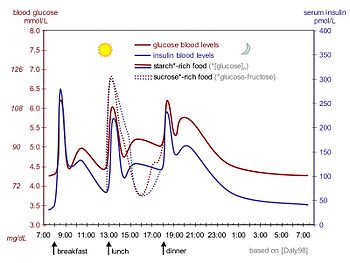We diabetics have to pay even more attention to our teeth and gums than other people.
We are at greater risk of cavities, gum disease and tooth infections. Not only that, but those infections can cause our blood sugar to rise, so it becomes a vicious cycle.
 |
| Idealized curves of human blood glucose and insulin concentrations during the course of a day containing three meals; in addition, effect of sugar-rich meal is highlighted; (Photo credit: Wikipedia) |
Plaque
Plaque is, of course, a problem for many people, not just diabetics. But it's caused by starches and sugars, and of course we have more than our share of those! So diabetics are highly prone to plaque.
Dry mouth
Sometimes my mouth is so dry in the morning I can hardly speak—I'm sure you know how that feels. But it's more than just inconvenient, it's dangerous to the health of our mouths. You see, saliva washes away many of the bacteria that cause cavities and gum disease. Dry mouth cuts the amount of saliva available for this job, so the result is more cavities and gum disease. Dry mouth sometimes also creates inflammation of the soft tissue in the mouth, making eating difficult and unpleasant.
While there are artificial saliva substitutes, which your dentist can tell you about, you can usually stimulate your own saliva by sucking on a sugar-free hard candy. I like no-sugar-added Ricola for this purpose. And of course, drinking water helps.
Fungal infections
Not only do we diabetics have less saliva than we need, but the saliva we do have is high in sugar content, so it's double trouble for us. This can cause a fungal infection called candiasis, commonly known as thrush. It produces sore red or white spots in the mouth. Medication can help though, so ask your dentist.
As a diabetic, you must pay great attention to oral hygiene. Brush your teeth twice a day, and floss daily. Examine your gums for signs of problems—and always visit your dentist at least twice a year.

No comments:
Post a Comment